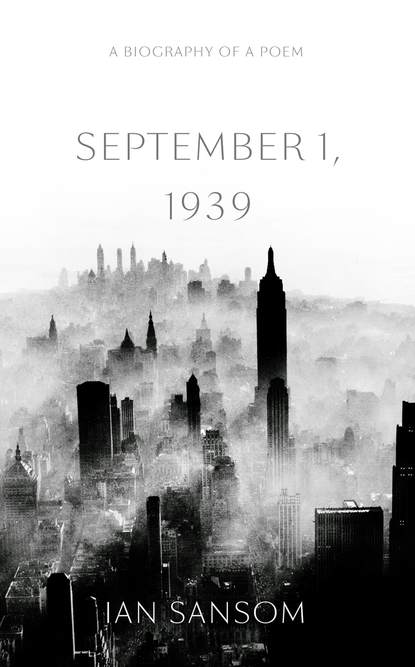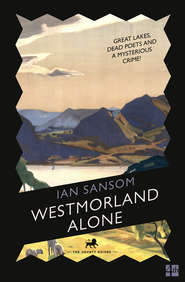По всем вопросам обращайтесь на: info@litportal.ru
(©) 2003-2024.
✖
September 1, 1939: A Biography of a Poem
Настройки чтения
Размер шрифта
Высота строк
Поля
Waves of anger and fear
Circulate over the bright
And darkened lands of the earth,
Obsessing our private lives;
The unmentionable odour of death
Offends the September night.
I ≠ A (#litres_trial_promo)
The first words of the poem: I sit.
It’s hardly a stirring start, is it?
Who on earth begins a poem from a seated position?
And who sits?
Auden sits?
*
There is no reason to assume that the ‘I’ who is sitting here at the beginning of the poem is necessarily the poem’s author, Wystan Hugh Auden, who was born in York on 21 February 1907, the youngest of three brothers, son of George Augustus Auden, a doctor, and Constance Rosalie Auden (née Bicknell), who had trained as a nurse and who loved opera and who doted on her precocious son. (Of his parents, Auden remarked that ‘Ma should have married a robust Italian who was very sexy […] Pa should have married someone weaker than he and utterly devoted to him. But of course, if they had, I shouldn’t be here.’)
The ‘I’ could be this Auden – the Auden who we know attended Gresham’s School in Holt in Norfolk and who in 1925 went up to Christ Church, Oxford, graduating three years later with an inglorious Third, and who in the late 1920s and 1930s worked variously as a teacher, a reviewer and as a documentary film-maker with the GPO Film Unit. It could be the Auden who travelled to Weimar Berlin and to Iceland, and who went to Spain to support the newly formed Republican government, where he witnessed the brutalities of the civil war and where he wrote some of his most famous poems, ‘A Communist to Others’ and ‘Spain 1937’, poems which, as with ‘September 1, 1939’, he later disowned, describing them as ‘dishonest’.
It could be – couldn’t it? – this Auden, the Auden who in January 1939 sailed to America with his friend the playwright Christopher Isherwood, their departure seen by many in England as a betrayal of their country in its hour of need, and the Auden who soon after arriving in New York met the eighteen-year-old Chester Kallman, who became his lifelong companion and lover. (They exchanged rings and behaved to all intents and purposes as a married couple – for better and for worse – even though in 1935 Auden had already married Erika Mann, the daughter of the novelist Thomas Mann, in order to assist her escaping Nazi Germany, an act he described as a ‘bugger’s duty’.)
It could be him: the Auden who lived his adult life mostly in New York, teaching at various colleges and universities, who in 1945 served as a major in the US Air Force in their Strategic Bombing Survey, and who in 1946 became a US citizen. It could be the Auden who was Professor of Poetry at Oxford from 1956 to 1961, the Auden who summered on the Italian island of Ischia, the Auden who bought a house in Kirchstetten in Austria and who published during his lifetime more than a dozen books of poetry, as well as volumes of essays, plays and libretti, the very Auden who died in Vienna on 29 September 1973, the death certificate giving the cause of death as ‘hypertrophy of the heart’.
It could be that Auden.
But probably not.
*
There is no need to assume it is Auden who is sitting here at the beginning of the poem, any more than we need assume that the often sad and lonely ‘I’ in Shakespeare’s sonnets, in sonnet 29, say (‘When, in disgrace with fortune and men’s eyes, / I all alone beweep my outcast state’), is necessarily or entirely the William Shakespeare of Stratford-upon-Avon, who may or may not have been the author of the plays that bear his name and who famously left his wife Anne his second-best bed; or that the wildly jubilant ‘I’ of Walt Whitman’s ‘I Sing the Body Electric’ is the big-bearded bard from Long Island; or that when we read at the beginning of Anne Sexton’s poem ‘Double Image’ that ‘I am thirty this November’ we can safely assume that Sexton herself was thirty that November, though she was and we do, we almost always assume that the speaker of a poem, the voice on the page, is indeed the ‘I’ of the poet.
*
It’s definitely not Auden.
*
It’s Auden.
The artist must be in his work as God is in creation, invisible and all-powerful; one must sense him everywhere but never see him.
(Gustave Flaubert, letter to Mademoiselle Leroyer de Chantepie, 18 March 1857)
This is what we do know: an ‘I’ is not always a self; an ‘I’ is not a proxy for a person.
We feel that in the cases in which ‘I’ is used as subject, we don’t use it because we recognise a particular person by his bodily characteristics; and this creates the illusion that we use this word to refer to something bodiless, which, however, has its seat in our body. In fact this seems to be the real ego, the one of which it was said, ‘Cogito ergo sum’.
(Ludwig Wittgenstein, The Blue and Brown Books, 1958)
(This is one of the things that poems do for us: they present us with an ‘I’ that is not a body – but which may be a person. Or if not a person, an ego. Or if not an ego, then a thinking machine. The ‘I’ is a function. It is an algorithm. A process. The ‘I’ is – or can be – simply the poem.)
*
You can tie yourself in all sorts of philosophical knots with this sort of thing, obviously: who am I, what is ‘I’, is ‘I’ an unchanging object through time and space? But this way metaphysics and ontology lies – which is a route I cannot follow. I am not equipped.
A better, blunter, bluffer question might be not ‘Who am I?’ or ‘Who is “I”?’, but rather ‘Who cares?’
To which the honest answer is probably: no one. No one cares at all.
Not even if you’re W. H. Auden.
Which is, of course, why we write ‘I’.
I says ‘I am’.
*
Or ‘I Am!’
I am! yet what I am none cares or knows,
My friends forsake me like a memory lost;
I am the self-consumer of my woes,
They rise and vanish in oblivious host,
Like shades in love and death’s oblivion lost;
And yet I am! and live with shadows tost.
(John Clare, ‘I Am!’)
John Clare wrote this poem in Northampton General Lunatic Asylum, where he spent the last twenty years of his life. Clare – or the ‘I’ of the poem – clearly feels alone and isolated, the ‘self-consumer’ of his woes. ‘And yet I am!’ he writes. It is in this act of defiance, in the act of writing, that he lives.
*
Writing, for many people – for those of us who keep diaries no one will ever read; for those of us who write only for ourselves and perhaps a few others; as for those who pursue literary fame for its own end; and indeed even for those, like Auden, who seem destined for true greatness and are proclaimed geniuses by the world at large – writing, for all of us, in different ways, is a way of saying, ‘And yet I am!’ Writing is a form of self-proclamation, of self-avowal.











